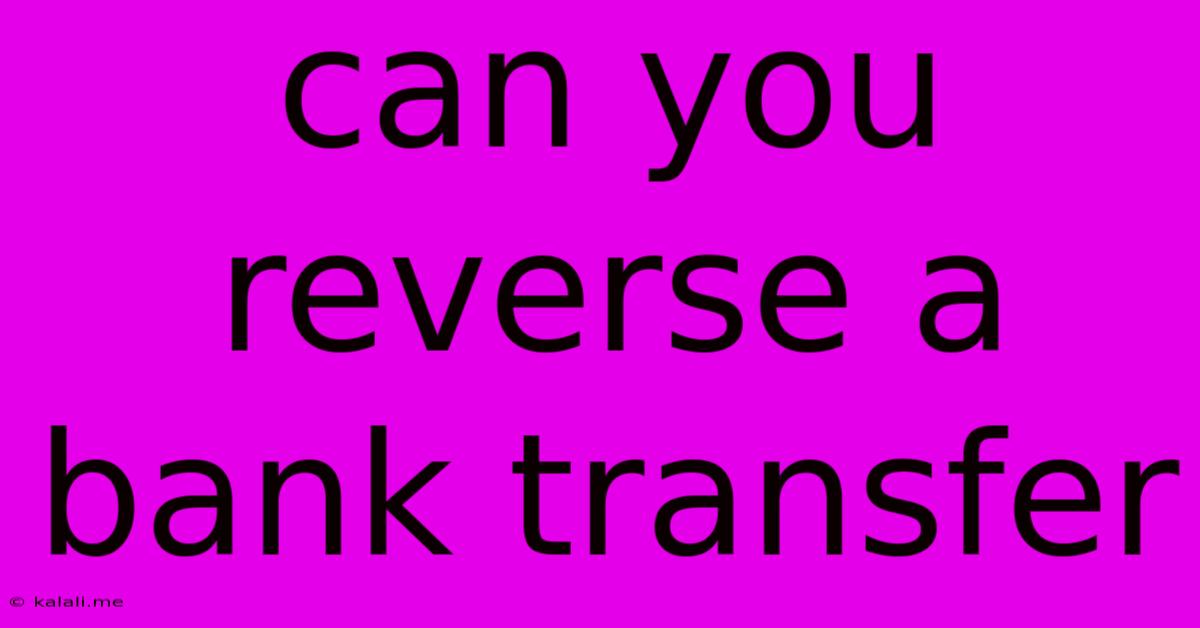Can You Reverse A Bank Transfer
Kalali
May 19, 2025 · 3 min read

Table of Contents
Can You Reverse a Bank Transfer? A Comprehensive Guide
Meta Description: Wondering if you can reverse a bank transfer? This guide explores the possibilities, factors influencing reversal success, and steps to take if you need to cancel a payment. Learn about different transfer types and their reversal options.
Reversing a bank transfer is a common question, particularly when dealing with mistaken payments or fraudulent activity. The answer, however, isn't a simple yes or no. The feasibility of reversing a bank transfer depends on several crucial factors, including the type of transfer, the speed of the transaction, and the banks involved. This comprehensive guide will break down the process, helping you understand your options and the likelihood of success.
Understanding Different Types of Bank Transfers
Before exploring reversal possibilities, it's crucial to understand the different types of bank transfers:
-
ACH Transfers (Automated Clearing House): These are electronic transfers processed in batches, typically taking a few business days to complete. Reversing ACH transfers is possible, but it requires immediate action and cooperation from both the sending and receiving banks.
-
Wire Transfers: These are faster, direct transfers that usually settle within a day. Reversing a wire transfer is significantly more difficult than reversing an ACH transfer, often requiring intervention from both banks and sometimes even legal action.
-
Real-Time Payments (RTP): These instant transfers are becoming increasingly common. Reversing an RTP payment is exceptionally challenging, and success hinges on immediate action and the cooperation of all parties involved.
Factors Affecting the Reversal of a Bank Transfer
Several factors influence the success of reversing a bank transfer:
-
Time Sensitivity: The sooner you act after realizing the error, the greater your chances of reversing the transfer. Banks are more likely to assist with reversals if the transfer hasn't yet been processed or received by the recipient.
-
Relationship with Your Bank: A strong relationship with your bank and a history of responsible banking can improve your chances of securing their assistance.
-
Reason for Reversal: A legitimate reason, such as a fraudulent transaction or a clear mistake, is more likely to lead to a successful reversal than a request based on buyer's remorse.
-
Recipient's Cooperation: If the recipient is willing to cooperate and return the funds, the reversal process becomes much simpler.
-
Bank Policies: Each bank has its own policies regarding the reversal of bank transfers. Some banks may be more lenient than others.
Steps to Take if You Need to Reverse a Bank Transfer
If you need to reverse a bank transfer, take these steps immediately:
-
Contact Your Bank Immediately: Report the issue to your bank as soon as possible, providing all relevant details, including the transaction amount, date, recipient's account information (if known), and the reason for the reversal request.
-
Gather Documentation: Collect any supporting documentation that can strengthen your case, such as proof of fraudulent activity or evidence of the mistake.
-
Contact the Recipient (If Possible): If appropriate and safe to do so, contact the recipient to explain the situation and request their cooperation in returning the funds.
-
Follow Up: Follow up with your bank regularly to check on the progress of your reversal request.
-
Consider Legal Options (If Necessary): In cases of fraud or unresolved disputes, consider seeking legal advice.
What Happens if the Reversal is Unsuccessful?
If your bank is unable to reverse the transfer, you may need to explore alternative solutions such as:
-
Dispute the Transaction: If the transfer was fraudulent, you might be able to dispute the charge with your credit card company or through your bank's fraud department.
-
Contact Your Payment Provider: If you used a third-party payment provider, contact them to report the issue.
-
Engage a Debt Collection Agency: You could pursue the recipient through a debt collection agency (though this is generally a last resort).
Reversing a bank transfer isn't guaranteed, but prompt action and clear communication with your bank significantly increase your chances of success. Remember that acting quickly is key. The longer you wait, the more challenging the reversal process becomes.
Latest Posts
Latest Posts
-
Instagram Something Went Wrong Creating Your Account
May 19, 2025
-
Dialling Code For Italy From Uk
May 19, 2025
-
Fallout 4 The Battle Of Bunker Hill
May 19, 2025
-
Will A Cat Eat A Rabbit
May 19, 2025
-
Looking Forward To Meeting From You
May 19, 2025
Related Post
Thank you for visiting our website which covers about Can You Reverse A Bank Transfer . We hope the information provided has been useful to you. Feel free to contact us if you have any questions or need further assistance. See you next time and don't miss to bookmark.